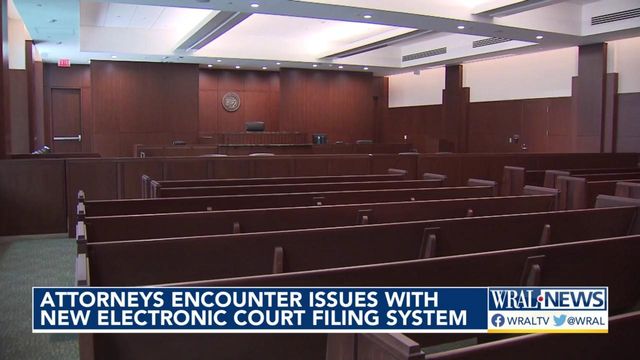Judicial officials call for patience, prayers as electronic court filing system launches
A new court filing system debuted this week, causing frustration and delays in the legal community. But overall, state officials say, things are going well.
Posted — UpdatedNorth Carolina’s courts system launched a $100 million overhaul of court filing systems in four counties this week, causing some complaints, confusion and delays.
Wake County’s superior court clerk compared the move — from a paper filing system to an electronic one — to giving birth or passing a kidney stone.
“If someone tells you about a kidney stone, you’re just like, ‘OK, a kidney stone,’” clerk Blair Williams said. “But until I experienced a kidney stone, I never knew what a kidney stone was.”
Some lawyers expressed frustration Thursday, saying routine tasks are taking much longer.
"Courts were already backed up, and now they're backed up even more," attorney Seth Blum said. "It's a real mess."
The North Carolina State Bar Association said it didn’t know of any significant issues related to the operation of the system. The director of the Administrative Office of the Courts, who is overseeing the transition, said there were some hiccups, but no catastrophes, and that overall things are going well four days into the project.
“I would put it squarely within the bounds of what I would consider a successful rollout,” AOC Director Andrew Heath said.
The plan is to launch this system in all 100 North Carolina counties by the end of 2025. The rollout started Monday in Wake, Johnston, Lee and Harnett counties. Mecklenburg County is up next, Heath said, starting in May.
“I’m having some frustration from people outside the courthouse,” Johnston County Superior Court Clerk Michelle Ball said Thursday. “I’m having some frustration myself sometimes. But, overall, I think that we have vetted [the system] well, and we are rolling on.”
This system was once set to launch in the fall, but it was delayed until Monday. There was enough nervousness that Heath reached out to judges around the state Friday to say North Carolina Supreme Court Chief Justice Paul Newby, who oversees the Administrative Office of the Courts, wanted them to pray for the rollout, and asked them to pass the prayer request along to others.
“The AOC staff and those of the pilot districts have done all we know to do to make the go-live successful,” Newby said in the email. “Obedience is ours, outcomes belong to the Lord. Please pray for God’s blessing on this project.”
The new system comes from Tyler Technologies, a company that sells public-sector software, which the Administrative Office of the Courts says has contracts in 38 states. The initial contract in North Carolina was for $85 million over 10 years, but it grew to $100 million because the state asked for added capabilities, Heath said.
Williams said the new system has more steps than the old one, exposing long-standing staff shortages in his office. What took 10 or 20 minutes under the old system “will now take us 40 minutes,” he said.
Asked whether that delay will persist once his team gets used to the new system, Williams said he wasn’t sure.
Heath said there has been “some intermittent slowness” from the system itself, and some glitches. But much of the delay comes from the learning curve – staff and public getting comfortable with a system that hadn’t changed much in decades.
Heath asked for patience.
“Don’t judge the system after three days or six days, but maybe after six months when everybody’s hardened into the system and knows how to use it,” he said. “These delays will be reduced, and the system will improve, it’s just going to take a little bit of time.”
• Credits
Copyright 2024 by Capitol Broadcasting Company. All rights reserved. This material may not be published, broadcast, rewritten or redistributed.





